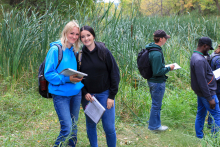Assiniboine partners to deliver new COVID-related program
December 11, 2020
Assiniboine Community College has partnered with Algonquin College to deliver a new COVID-related program, which will provide more than 250 Indigenous youth across Canada with hands-on job training and employment skills related to the impact or effects of the pandemic
“We are extremely pleased to be able to introduce this new program to provide essential services during this pandemic, while also assisting youth to discover new employment pathways and opportunities in the years that follow,” said Tannis James, Director of Continuing Studies at Assiniboine.
“The program is designed for students to build foundational knowledge and skills to assist their communities to navigate the current COVID-19 pandemic, while simultaneously helping them identify and prepare for other employment opportunities elsewhere in the years to come.”
See full Algonquin release below:
ALGONQUIN COLLEGE LEADS A $2.5-MILLION COVID-RELATED PROGRAM TO HELP INDIGENOUS YOUTH
OTTAWA (Dec. 9) – With funding from the federal government, Algonquin College is leading a $2.5-million program to provide more than 250 Indigenous youth across Canada with hands-on job training and employment skills related to the impact or effects of the pandemic.
The program, funded by the Government of Canada’s Youth Employment and Skills Strategy, is delivered by 11 federal departments, agencies and Crown Corporations to help young people gain work experience and skills they need to enter the labour market. The funding is provided under Phase 2 of the COVID-19 Emergency Support Fund announced in June by Prime Minister Justin Trudeau. It is deployed by Employment and Social Development (ESDC) to address the pandemic, focusing on high-demand and critical sectors such as health, community services, and information technology.
With the ESDC’s funding, the College’s COVID-19 Rapid Response Initiative will support between 250 and 275 Indigenous youth in receiving work placement, training and skills to help them find employment in their communities. The College will provide funding to a number of organizations to deliver training and development programs in more than a dozen First Nations communities in Nova Scotia, New Brunswick, Quebec, Ontario, Manitoba, Alberta, Saskatchewan, British Columbia and the Northwest Territories.
The projects generally reflect community experience in responding to the pandemic. For example, several Indigenous communities want to set up food sustainability projects that would make them less reliant on outside sources.
“Algonquin College excels at delivering this kind of experiential learning and is excited to play an important role in the federal government’s Youth Employment and Skills Strategy,” said Claude Brulé, President and Chief Executive Officer. “We are pleased and proud to demonstrate our commitment to Truth and Reconciliation by helping Indigenous youth gain the skills that serve them and their communities.”
“The Government of Canada is proud to support innovative programs that aim to help young people reach their potential, and enter the workforce,” said Carla Qualtrough, Minister of Employment, Workforce Development and Disability Inclusion. “Especially during these difficult times the government has taken action to support youth through a comprehensive package of COVID-19 supports and measures. One of these measures is Algonquin College’s COVID-19 Rapid Response Initiative, funded under the government’s Youth Employment and Skills Strategy. This initiative will help Indigenous youth acquire the skills and training they need to integrate into the job market, realize their potential and pursue successful careers.”
Algonquin College is one of 13 institutions, organizations, and agencies – from the Halifax YWCA and the Canadian Mental Health Association to Trucking HR Canada and Simon Fraser University – selected to deliver ESDC’s additional funding to respond to the impacts of COVID-19 on youth through the Youth Employment and Skills Strategy.
Algonquin’s partners in the COVID-19 Rapid Response Initiative include:
- The Confederacy of Mainland Mi’Kmaq in Nova Scotia;
- The Tobique, Elsipogtog, and Esgenoopetitj First Nations in New Brunswick;
- Akwesasne Education & Training Institute in southwestern Quebec;
- The Wabano Centre in Ottawa;
- Tsi’ Niyukwaliho:^ Learning Centre in Southwold, Ont.;
- Assiniboine Community College in Brandon, Man.;
- Aboriginal Health and Wellness Centre of Winnipeg;
- Montreal Lake Cree Nation, Sask.;
- Little Red River Cree Nation and the Enoch Cree Nation, Alta.;
- Thompson Rivers University in Kamloops, B.C.
- The Industry Training Authority in Richmond, B.C.;
- Fort Good Hope in the Northwest Territories.
“This is a welcome opportunity at a very difficult time for everyone,” said Ron (Deganadus) McLester, Vice President, Truth, Reconciliation & Indigenization. “It is quite interesting and very telling that half of the partner communities are focussing on sustainability and food security, reflecting a very real need on First Nations.”



